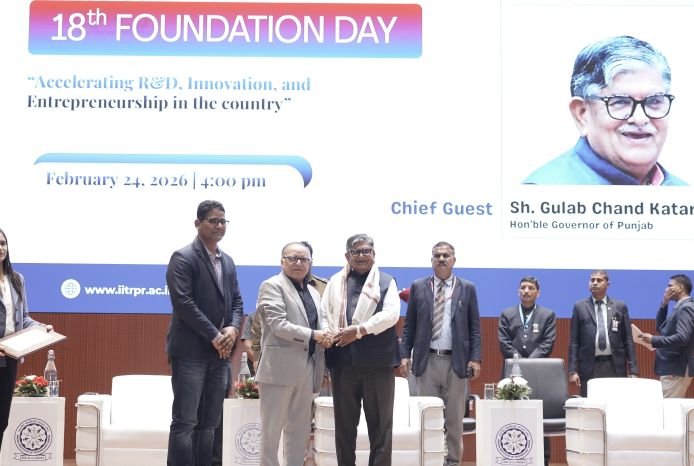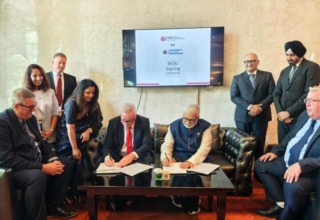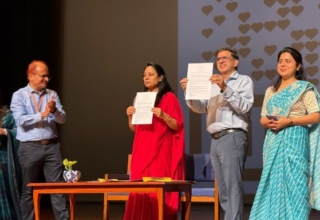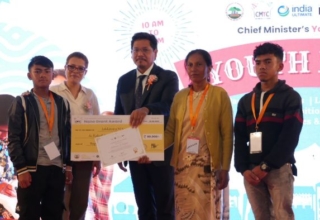
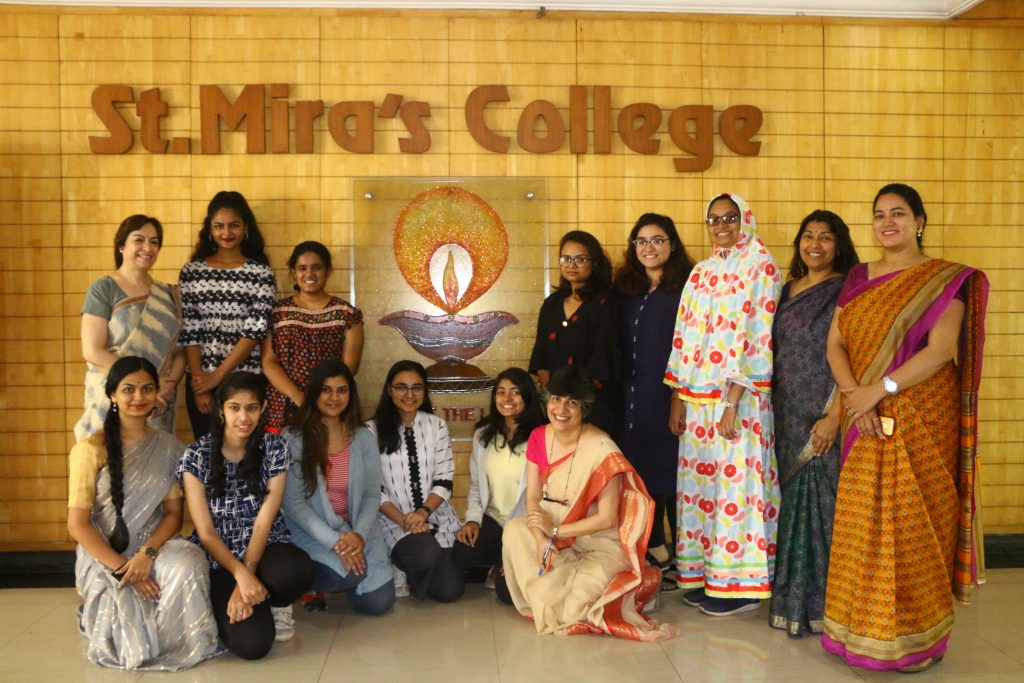
Collaborative Online International Learning (COIL), an initiative started by State University New York (SUNY) in 2010, has really gone global with international partners and participating institutions in an approach to fostering cross-cultural student competence through development of multicultural learning environments that link university or college classes in different countries. In September this year, St Mira’s College Pune and LaGuardia Community College New York came together for a pedagogical experiment under COIL on understanding narratives of partition and to explore the process of healing thereafter. The two institutions were joined by University of Liberal Arts, Dhaka, Bangladesh and University of Management and Technology, Lahore, Pakistan in this important discourse.
A group of students from these four educational institutions came together at St Mira’s College, Pune in September for collaborating on a shared syllabus that includes the popular novels Ice-candy Man by Bapsi Sidhwa and Train to Pakistan by Khushwant Singh and some short stories around partition of India in 1947. Further more students from Korea, Jamaica, West Africa, New York, India, Pakistan and Bangladesh and from diverse religious backgrounds will converse under this initiative about putting the past behind them and building a new future.
Probably the first such COIL program in south Asia, the aim behind this academic initiative was to expose youngsters to a thought process and a belief system that endorses goodness, kindness and inclusivity. The students who have enrolled for it will be participating in all the online lectures which are also part of their credit grading for one semester from September 10th till December. The COIL program will include writing assignments together on common Google docs, shared videos, WhatsApp and skype interaction.
“Communication opens your mind to unthinkable possibilities and puts things in perspective. This is precisely what COIL has done for me. It’s a dream come true to experience what it’s like to be a part of a global learning environment,” says Ummesalama Karu, student of SYBA English (Hons) at St Mira’s College, Pune.
COIL which is focused on the emerging field of Globally Networked Learning (GNL) also provides innovative cost-effective internationalization strategies. In a way it is becoming a significant teaching and learning methodology for the youth and education institutions. And what better problem statement for youth of Indian subcontinent than understanding the history of tragic chapter of partition and moving past it by bringing people close to each other.
“The COIL program gave me a chance to personally come in contact with students from Bangladesh, New York and especially Pakistan and hear their point of view on the most horrifying incidents in our shared past—Partition. A land that had shared the same ancient history, same golden prosperity and the same name became violently divided. Generations-owned, lively, loving homes became empty and the ruins in a faraway land, a helpless sanctum for millions of people… I think it is very important to learn about this similarity, listen to the other side of the same heart-wrenching story, stop blaming each other, and put an end to this cycle of hatred and toxic superiority,” says Khadija Lokhandwala, a TYBA English (honors) student of St Mira’s College, Pune.
In words of Emerald Melissa Anthony, a B.S. (Hons) English Literature student of Lahore-based Institute of Communication and Culture Studies, who participated in the program at Pune, COIL is an effort of negotiation ‘as I see it.’ “The necessary and much needed exchange of attitudes and words over specific partition and post-partition concerns and crises is what I think we are aiming to achieve through COIL, and we have made some progress even if it’s just a quarter of the whole… the recent India-Pakistan crises situated me into a dilemma, and I am very sure that is the situation of every citizen not just across my side of the border, but also on the other side. While some are dealing with it in a very serious manner, giving away moral lessons and counting their days to the predicted apocalypse under war, there are others who are joking the crises away as if it was nothing but just an amateur argument in school between two opposing teams,” she adds.
Afsana Rahman, a student of English literature at University of Liberal Arts Bangladesh (ULAB), Dhaka, Bangladesh, who was part of this project, grew up hearing about his country’s Liberation War of 1971 and had very little idea about the partition of 1947. In Bangladesh, it is the general feeling that ’71 is something that actively concerns us and the partition of ’47 has everything to do with India and Pakistan only. “However, as we are reading “RabeyaApa”, we are learning more and more about the Partition and the blood and toil that have gone behind it. A deeper look into this would make it clear that the Partition has not affected us the Bangladeshis any less than it has affected India and Pakistan. The mindless and blind rage and cruelty that ‘brothers’ and ‘neighbours’ have shown to one another was beyond our comprehension,” he says.
The incredible opportunity of learning partition of India through virtual platforms excites Casey Larsen, a “World Literatures in English” class student from LaGuardia Community College, City University of New York, New York, USA. “I had never once heard of The Indian Partition even after having completed many levels of history courses. Acquaintance about events so horrifically world-altering is expected. As we read Partition-based literature, COIL (Collaborative Online International Learning) created a platform where we spoke with students from India and Pakistan about their history, culture, and the current status of the countries,” adds Casey Larsen.
The scars of partition run deep and it is not easy to forget past. But we must remember that both sides lost an equal number of lives, destroyed an equal number of homes and forced an equal number of people to abject poverty. The thing that made the most impact on participant students by engaging in this programme, was learning how strikingly similar the two nations are.
“I grew up with the same petty, blind dislike for Pakistan that is portrayed so strongly in news channels and the media. A few years ago, one of my friends visited Pakistan and she was surprised by their generous hospitality and love for India. The first thing that a shopkeeper said when he learned that my friend was Indian, was not anything about politics or war but Bollywood! This was the first time when I learned to see Pakistanis as not just a label, but as real people,” says Khadija Lokhandwala.
And then Emerald from Pakistan reflects the mood on streets, “ We are crazy in the pursuit of war; we are aware yet poignantly blind to the doom that it inflicts upon nations. I really wish it could end because the amount of prosperity that the two nations can achieve together or as friendly nations side by side, they can never even imagine of achieving close to that, as nations at war for eternity.”
Partition caused three wars and 70+ years of animosity unresolved to this day. The history of this event remains orally conveyed and lack of this conspicuous topic in world history is daunting. “Hopefully through COIL, we are able to one day patch up these historical wounds still bleeding into the present and mold a future that encompasses the peaceful narrative for which COIL was created,” feels Larsen while adding that COIL has offered a sort of multi-cultural sanctuary for diplomatic, deferential, and educated dialogues. “By crafting these friendships, we loosen the stigma of bigotry, cognize differentiating point of views, and work towards unveiling a tragedy often left out of history books!”
More power to COIL and welcome to India!
- By Autar Nehru




